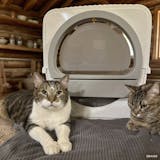When your cat is lying or sleeping in their litter box, it typically signals stress or a medical issue. Cats are naturally very clean, so this behavior is unusual and worth investigating. To determine the specific reason, observe your cat closely. They might be feeling territorial, pregnant, bored, or playful. Here’s a detailed guide to help you understand and address this behavior:
1. Your Cat Could Be Stressed
The litter box’s small, enclosed space with familiar smells can be comforting to a stressed cat. Stress triggers include:
- Recent Adoption: Moving to a new home can be overwhelming for a cat, and they might seek solace in their litter box.
- Moving Houses: Changes in environment can be disorienting, and the litter box offers a familiar sanctuary.
- Introduction of a New Pet: A new cat, dog, or other pet can make your cat feel threatened or insecure.
- Arrival of a New Baby or Person: New household members can disrupt your cat’s sense of security.
- Home Renovations: Changes in their territory can cause anxiety.
Signs of a stressed cat include excessive grooming, scratching, increased meowing, excessive sleeping, aggression, reduced appetite, and fur shedding. If your cat is hiding with a tense, crouched stance, dilated pupils, and a tucked tail, they are likely stressed.
To alleviate stress:
- Create a Safe Space: Ensure their environment is enriching with places to hunt, hide, scratch, and sleep.
- Routine and Familiarity: Maintain a consistent routine to provide a sense of security.
- Clean the Litter Box Regularly: A clean litter box can offer comfort and reduce additional stress.
If stress persists for over a week, consult your vet for further advice and potential treatment options.
2. Your Cat Might Be Sick
Medical issues such as urinary tract problems or digestive issues can cause cats to lie in the litter box. For example, urinary problems like crystals in the urinary tract are painful and can be fatal if untreated. Signs include:
- Urinating Outside the Litter Box: Indicates difficulty or discomfort in urinating.
- Vocalizing in the Litter Box: A sign of pain while trying to urinate.
- Straining While Urinating: Struggle to pass urine.
- Excessive Genital Licking: Trying to alleviate discomfort.
- Blood in Urine: Visible signs of a serious issue.
Gastrointestinal issues like constipation and diarrhea can also cause this behavior. Look for symptoms like vomiting, weight loss, dehydration, lack of appetite, and lethargy.
If you suspect a medical issue, take your cat to the vet immediately for diagnosis and treatment. Early intervention can prevent serious health problems.
3. Kitty Could Be Feeling Unsafe, Territorial, or Pregnant
New animals, guests, loud noises, or an unfamiliar environment can make your cat feel threatened, leading them to seek refuge in the litter box. Ensure each cat has their own litter box to prevent territorial disputes.
If your cat is unaltered and has access to a male, they might be pregnant and seeking a safe place to give birth.
Provide a better alternative, like a cozy cat cave near the litter box, and gradually transition them to a more convenient location.
4. Your Cat Could Be Signaling a Need for Attention
Cats might lie in the litter box if they need a check-up or are experiencing mobility issues like arthritis. Older cats might find it painful to move in and out of the litter box.
Make the litter box more accessible with lower sides and consult your vet for further assistance. Regular vet visits can help detect and manage age-related health issues early.
5. Your Cat Might Be Bored
Cats love their routine and are meticulous about their litter box habits. If they start lying in the litter box, they might be seeking attention due to boredom. Young cats and kittens are especially prone to this behavior.
Provide new toys, climbing posts, or interactive games to keep them engaged. Spending quality time with your cat through play and interaction can alleviate boredom and reduce unwanted behaviors.
6. You Might Have Changed the Litter
Cats prefer familiarity. If you recently changed the type of litter, your cat might be exploring and marking it with their scent. This behavior is common when switching between different types of litter, like from non-clumping to clumping.
Ensure the new litter feels comfortable for your cat and monitor them for any signs of distress or discomfort. If your cat is feeling itchy and scratching a lot, they might have parasites like fleas, requiring a vet visit. Gradually introduce new litter to help them adjust.
Conclusion
Understanding the reasons behind your cat's behavior and taking appropriate actions can ensure their comfort and health. Regular observation, maintaining a clean and stress-free environment, providing medical care when needed, and engaging your cat in stimulating activities are key to addressing this issue. If in doubt, always consult your vet to rule out any serious health problems and get professional advice tailored to your cat's needs.









